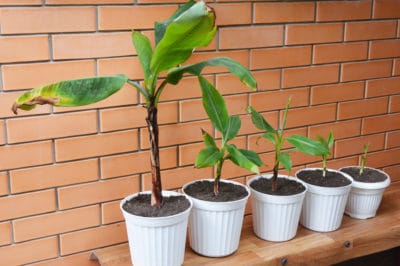Growing Bananas
Bananas can grow in the tropics as well as USDA zones 8 to 12 in more temperate areas, depending on the species. In all cases, they need bright indirect light indoors and dappled shade with minimal direct sun outdoors, fertile, well-drained soil and plenty of water. They must be fertilized regularly and prefer high humidity.
Some Basic Banana Facts
Here are some interesting facts about bananas:
- Bananas don’t actually grow on trees – they are perennial shrubs.
- Bananas – depending on the variety – are eaten both fresh and cooked.
- It takes over a year for most bananas to produce a flower stalk; the plant dies after flowering.
- The banana tree “trunk” is actually a whorl of tightly packed leaves.
Bananas in Containers
Although almost any banana can be grown in a container, larger bananas – which are more likely to produce edible fruit – need a big pot. Some of the bananas grown primarily for their foliage may only top out at 18 inches to two feet; a five-gallon pot gives plenty of room. Taller bananas should have a minimum of a 15-gallon pot.
Choosing the Right Pot
After ensuring adequate room, the next most important factor in selecting a pot for bananas is good drainage. Although bananas need plenty of water while actively growing, soggy soil encourages root rot. In humid areas, unglazed clay is a good choice, as it allows water to evaporate through the sides. Otherwise, glazed ceramic or plastic containers work well.
Long-Distance Shipping
The commercial edible banana is definitely a tropical plant and the one most likely to be shipped long distances. Bananas are picked green, but they continue to “breathe” or transpire during shipment. They need temperature-controlled environments and exposure to ethylene gas to ripen off the tree. Commercial metal shipping containers with refrigeration units are used for long-distance shipping.
Bananas for Lunch
Although bananas have their own protective skin, they bruise easily. Plastic protectors are often used in order to carry the banana in a lunch box. Some are designed to hold only bananas with peels. Others can be used for peeled bananas. Sometimes called banana keepers, they come in various sizes and colors and are usually made of two pieces that snap apart.
